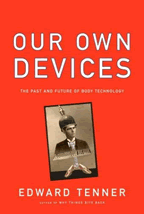
Our Own Devices
The Past and Future of Body TechnologyBy Edward Tenner
Knopf. 314 pp. $26
Reviewed by Richard Di Dio
Philadelphia Inquirer - Sunday, June 8, 2003
For physicists, string theory is one of the great hopes for an ultimate theory of matter. However, this "theory of everything" leaves out some tiny details - human behavior, for example. In Our Own Devices: The Past and Future of Body Technology, Edward Tenner focuses on everyday objects instead of subatomic particles. In this stellar fusion of how we design and use technology, and how technology in turn transforms us, the simple shoestring is a more appropriate path to understanding everything that matters.
Using Tenner's broad definition of technology - the "human modification of the natural world" - a shoestring is a piece of technology. So are baby bottles, Roman sandals, reclining chairs and musical keyboards. These are "body technologies." They extend our abilities, protect us from harm, comfort us, and channel our interaction with the world. Proceeding from toes to head, Tenner provides an engaging and intricate analysis of the most basic body technologies, with shoes, chairs, keyboards, eyeglasses, and helmets forming a virtual human exoskeleton.
The unifying theme of Our Own Devices is the treatment of technique as an essential complement to technology. Thus, while the first technology that most of us use is the baby bottle, it is the technique of nursing that must be mastered by both child and mother. There is also a "creative and improvisational" role of technique in technological innovation. In the shoestring example, Nike designs now include variable-width lacing, incorporating innovative lacing techniques devised by hikers.
The complex interplay of technology and technique within a societal context affects us physically. Footwear may be our ubiquitous technology, but, with one billion people on Earth living a barefoot existence, this is not necessarily due to the need to protect our feet. In a self-fulfilling way, wearing shoes causes our feet to be too sensitive without them. Culture also delimits the types of shoes we wear, which can then affect how we walk. In Japan, for example, growing up wearing geta (two-piece clogs) leads to a measurable difference in gait between Japanese and Western males.
Every adopted body technology results in positive and negative consequences. The widespread use of baby formula may make us more susceptible to adult illness. High literacy rates correlate with high rates of myopia. Eyeglasses that correct this condition may cause children's eyes to grow differently, increasing their myopia. Stronger helmets lead to more violent contact in football. Tenner has described the "revenge of unintended consequences" in his previous book Why Things Bite Back. The unique arguments of Our Own Devices demonstrate that these unintended consequences are more far-reaching for basic body technologies because we have been defined by their associated techniques.
What will happen to us as technology and technique continue evolving? Already the exponential adoption of cell phones and Palm Pilots suggests that our future will see the ascendance of the thumb, the "proletarian digit" so useful in tying shoestrings.
Formerly executive editor of the Princeton University Press, Tenner brings both scholarly precision and droll humor to his topics. Where else will you learn that Harry Belafonte started the plastic sandal craze in Japan in 1950 by appearing in public wearing a pair? Or how the ur-technology of couch potatoes got its name? (La-Z-Boy was chosen in an employee contest, beating out "Slack-Back" and "Sit-N-Snooze.")
Our Own Devices is for "all those who are curious about familiar things." Analogous to using the technology he describes so well, reading Tenner's book has unintended consequences. It will make you aware of the profundity of simple things, and of how, like tying shoes with a shoestring, the techniques of using these objects define who and what we are.
Richard Di Dio teaches mathematics and computer science at La Salle University.